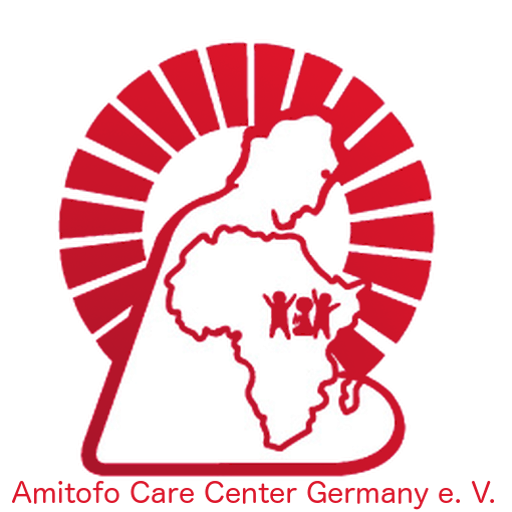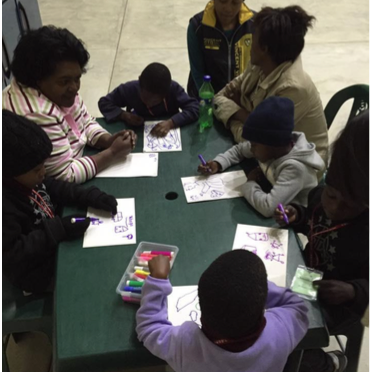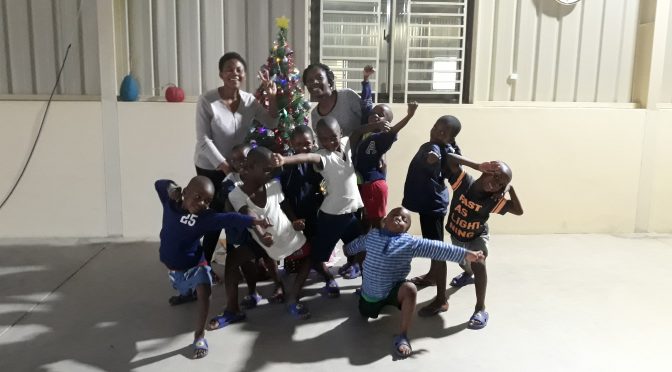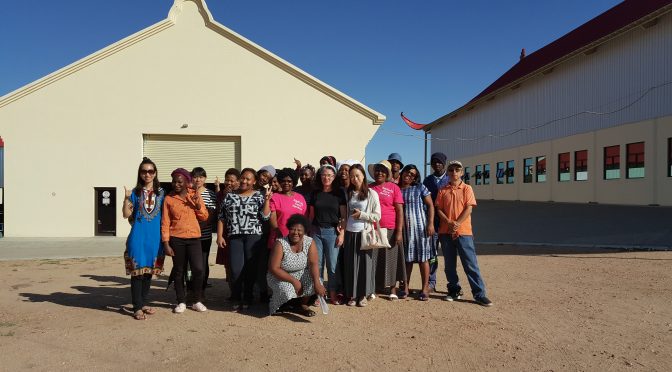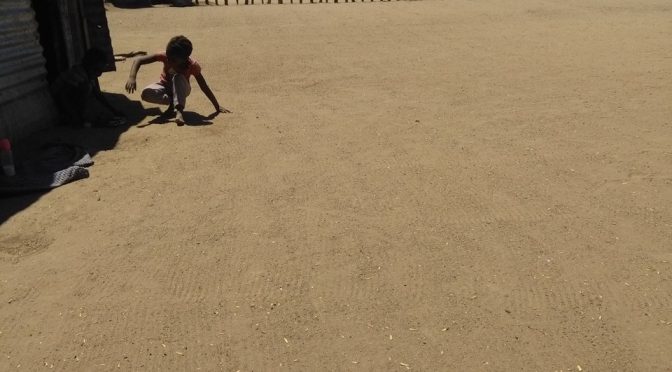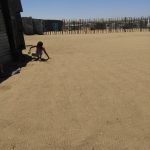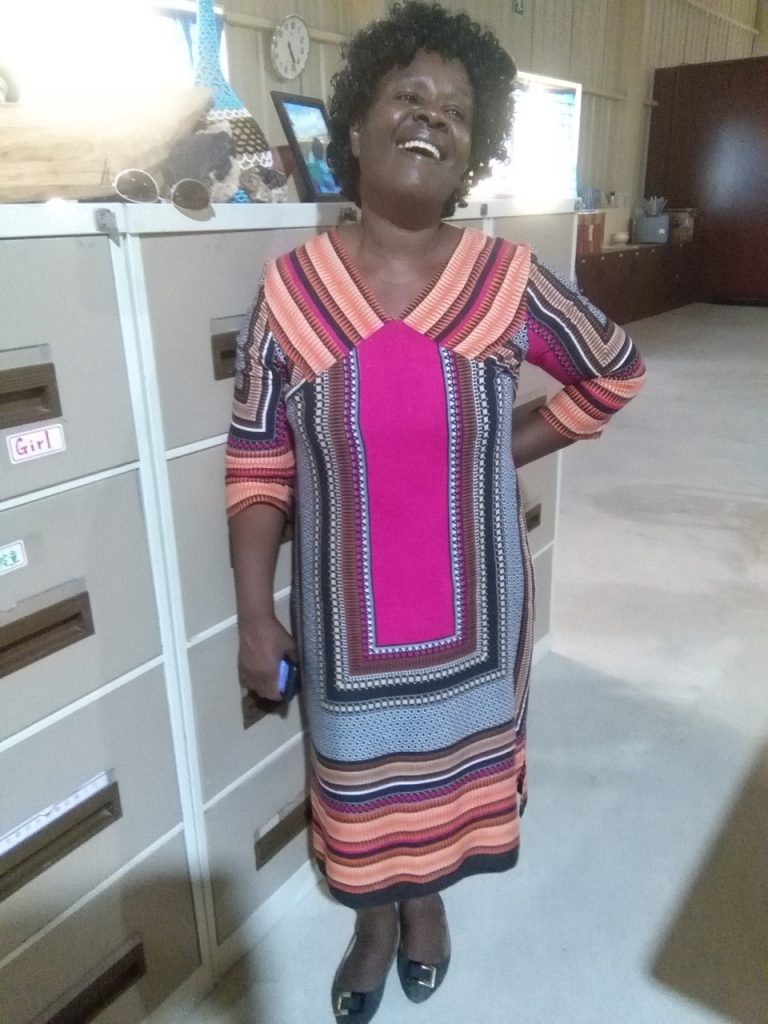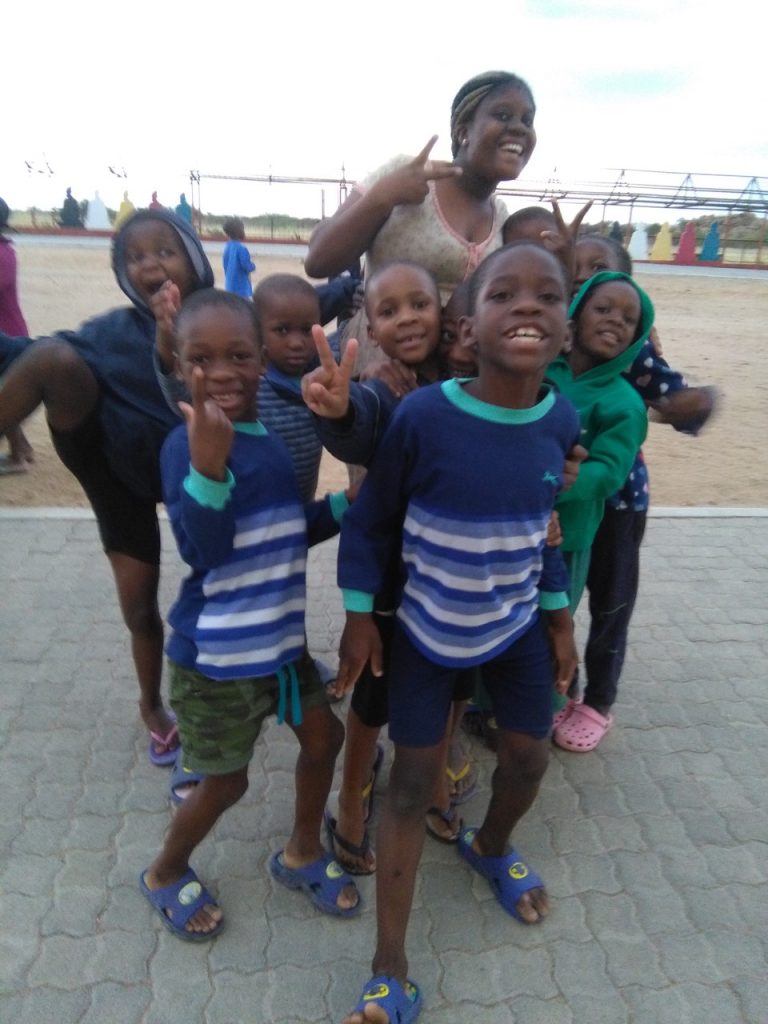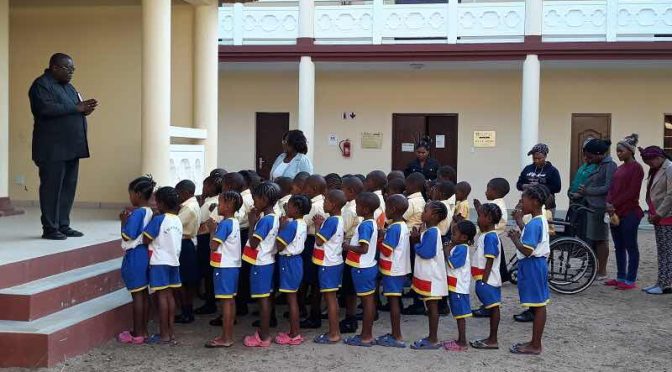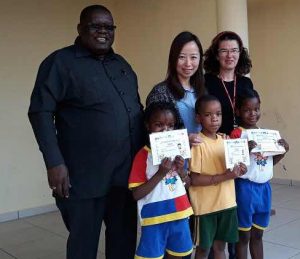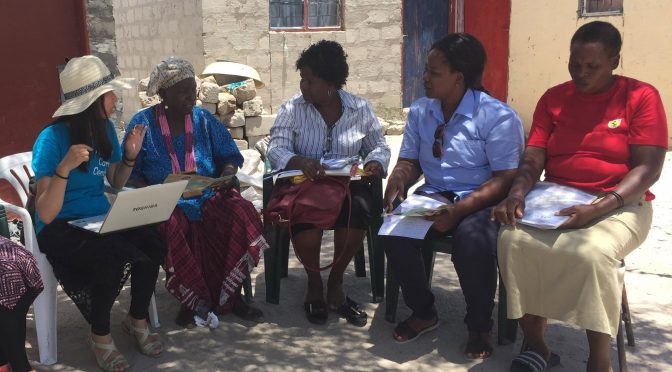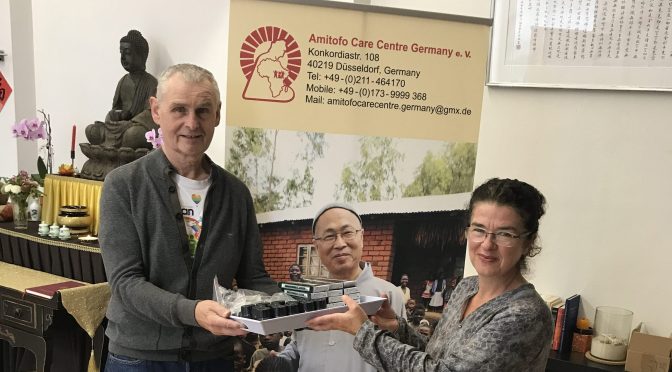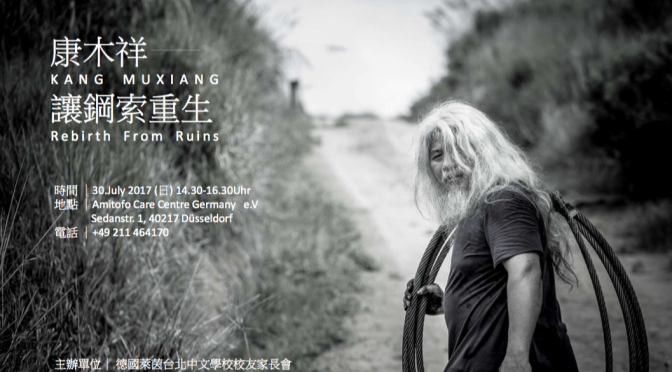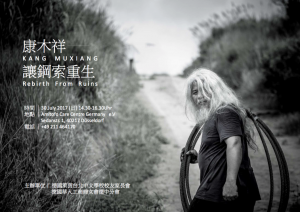Lecture on 18.02.2018 for the New Year Celebration
at the Amitofo Care Centre Germany e.V.
In Düsseldorf
2 Months at Amitofo Care Centre of Namibia (abbrv. ACC Namibia or Centre)
Report by Beatrix von Eycken
Page 1: Arrival
Page 2: The Daily Routine
Page 3: The Children at ACC Namibia: The Admission Process
Page 4: The Children and Buddhism
Page 5: The Motivation of Overseas Employees
Start Reading the full article on one page here:
Arrival
In May 2017, I met Bruce Tai, the Germany representative of Amitofo Care Centre, at the Vesak Festival of the Dhamadayada Association in Bochum. He described the work of ACC Namibia in Africa. Exciting. So exciting that more meetings followed, and I finally left for Okahandja, Namibia, on September 21, 2017 to support the organization for 2.5 months on site.
Min Min Chen, the director of the local Care Centre, with whom I had exchanged in advance, picked me up at the airport. I arrived at 6:30 in the morning, Min left even earlier from the centre to come to see me. Both of us felt a little hungry after a warm welcome and thus decided to take a small breakfast at the airport. Psychologically I had not really arrived in Namibia when she told me that she wanted me to do a human resources database. Mentally I was prepared for potatoes peeling and bed-making. That then the power in the entire airport broke down, I noticed only marginally. Everything had to be a good sign.
Finally, we made our way to the Centre. The ride takes about 90 minutes and you almost only see savanna. We drove by Okahandja, the nearest town with 26,000 inhabitants. 17 km later, the curved roofs of the Centre appear in the savannah. It quickly became clear that I had wrong imagination about the size of the site. It is huge!
We arrived at noon. Rest time for employees and children. Silence and warmth were the first thing I noticed. Now and then you hear a passing car. Otherwise only cicadas and birds. It took me a few days to notice how loud cicadas and birds are. When I arrived, I just noticed the absence of the familiar sounds of cars and planes.
At the end of 2017 on the premises, there will be a warehouse, the dining hall, which houses the administration, the Kung-Fu hall, the temple, the rooms for the staff, the school, children and nannies. At the end of the property there is a solar system, with which the centre is sustainably and independently supplied with electricity.
I am brought to my room: bed, cupboard, table, chair. Generous, bright, practical. On the first floor of the 2-story houses live women, men on the ground floor (because of the snakes and the possible burglars). Couples live in another building, where they have more space.
Water is scarce, Min told me on the way to the Centre. I did not dare to ask what that means. I am experiencing it now: It means that you only have water for 1 hour a day. From 19 – 20 o’clock. The hour is used to fill all possible containers with water. This stock will be used in the next 23 hours for cleaning, washing, toilet flushing etc. However, filtered drinking water is always available to everyone.
After a short break in my room, I made my way towards the administration. Without a shower, I was shown around and met my local and Asian colleagues and I am pleased about the friendly and attentive reception.
The daily routine
At the end of 2017, the Centre hosts 54 children, 11 overseas employees and 24 Namibian employees, some of whom live in the Centre, but to some extent also in Okahandja.
The days of Centre residents begin early. For the children with a morning ceremony in the temple. Then it goes for the first sports unit to the Kung-Fu hall. At 6:40 there is breakfast (Sundays at 7:00), lunch at 12:00, dinner at 18:00. All eat in silence. You only hear eagerly scraping of cutlery on dishes. After dinner, the adults who live in the Centre play with the children or pursue their own activities. At 19:00 o’clock the children and at 20:00 o’clock most adults are in their rooms. Wi-Fi was always a problem, so watching movies or surfing rarely worked. You go to bed early. My room was opposite of the temple. In the morning the singing of the children woke me up. There is hardly a way to wake up more beautifully.
For Julie, the cook and her team, as well as the children’s nannies, the working day started well before breakfast. For most other employees, the day starts at 8 o’clock. Until then, the bus which brings the staff from Okahandja, arrived. After lunch, there is a break for children and employees. Then work continues until 16:00 o’clock. The local staff, who do not live in the Centre, will be picked up again by 4:00 pm by bus. Only a few people can afford a private car. The bus is not public transport. There is almost no such thing. It is hired and paid by employees of various employers and then drives from station to station. ACC Namibia wants to change this for their own employees and organize their own transfer. This saves money and time for local employees.
The staff that stay at the Centre and the children share breakfast and dinner together. Every day and every meal, Julie and her staff serve Asian food for the overseas staff and local food for the kids and Namibian staff.
Saturdays will be worked till noon. After lunch, the free time begins. You can do your laundry (without a washing machine), watching the cows and goats that always get lost somewhere of the centre, playing GO (a strategic board game) with colleagues or badminton. When we found the game in one of the donation containers, the joy was huge.
For some professions, e.g. nannies, other working hours apply: they also work weekends, start earlier and work longer. They are entitled to free days, which they then have to take in such a way when care for the children by their colleagues is guaranteed. There are similar regulations for the kitchen staff.
Slowly, another sense of time sets in: There is always a lot to do, but the feeling of being rushed disappears. All life takes place in this one place. There are no long ways and you just have to take care of your task. Cooking, shopping, planning your free time: All these do not happen. Either because there is no possibility, or because others take care (like Julie about the food). There is hardly any distraction by the media.
The overseas employees are divided into two groups and on Sundays trips are made alternately. This opportunity is used to do the necessary shopping in Windhoek and Okahandja or to explore the area.
The children at ACC Namibia: the admission process
The children I encountered there were between 6 and 8 years old. The admission process is very time-consuming: The legal guardians can contact ACC Namibia via SMS, Whatsapp, telephone or e-mail. Each request will be responded. Towards the end of the year, in time for the start of the new school year (in January of each year), the director and the Namibian social worker Martha set off. All children for whom an application has been made will be visited. From time to time Min and Martha are accompanied by other staff, if e.g. translators are needed. There are 11 ethnic groups with their own languages in Namibia. English or Afrikaans is not always spoken in the families. In these cases, local employees with the appropriate language skills are drawn to translate.
Visits to the children serve to form an understanding of the circumstances in which they live. Orphans will be definitely accepted, half-orphan often. For the children, who still have both parents, a matrix has been developed that assesses: in which environment do the children live, do the parents have work, are the parents able to take care of the children, etc. Photos and a report from each child will be taken. Only after all children have been visited, the choice then be made. At the end of 2017, there were more than 100 applications, which means over 100 visits had to be done. And the distances in Namibia are great …
At the beginning of the school year, the children will be picked up by ACC Namibia and examined at the nearest hospital at the expense of the organization. This is where life begins in the Centre: Once you are admitted, all the school education, school supplies, drugstore items for the children, medical care, are provided by Centre. Also – if necessary – the journey to the family, because once or twice a year it goes back home. Shortly before the start of the big holiday in December, just before the end of the school year, the parents are invited to a Family Day. The children practice dances, songs, small plays and Kung-Fu choreographies, which they proudly show their parents. The parents should get an impression of the life of their children in the Centre. If the parents can not come because of the distances, they will be picked up and later brought home together with the children.
The children and the school
The school education is based on the Namibian curriculum and consists of the classes 1 – 12. The school operation in the Centre is still developing currently. At the end of 2017 there were the classes Pre-Primary and 1 and 2. With each school year the following will be added. Local teachers teach. Their selection emphasizes that they can live up to the circumstances. The children are coming from a difficult environment and have already been through a lot. They bring their problems, fears and worries to the Centre and often feel homesick at the beginning. All these need to be taken by experienced educators. To ensure this, the Namibian principal accompanies the selection of appropriate forces.
The additional offer from Centre also helps the children to settle in: they move a lot and receive Kung-Fu as well as meditation lessons. The principal confirmed that this helps them to calm down after a period of exercise. In order to increase the career opportunities of the children, they also receive Chinese lessons. Classes in these subjects are given by Asian teachers.
How do the children live?
The children live together with their nannies. A nanny takes care of 8 children, spends her time outside school, is the contact person and sleeps next door, so that the children are never alone. ACC Namibia strives to hire nannies from the same ethnic groups as the children. This is to make sure that they do not lose their roots, that they do not forget their own language (the school teaches English and Afrikaans, the lessons themselves take place in English), get to know their own songs and dances. Several children sleep in a room. Each has a desk, storage space for his or her belongings and a bed.
Martha, the Namibian social worker, is also always available with help and advice. She is a woman with great work experience, to whom children and employees trust. The children can contact her at any time, as well as the nannies, if they notice any abnormalities.
The children and Buddhism
Buddhism is virtually non-existent in Namibia. Most Namibians are Christians. Many are very religious. ACC Namibia is a Buddhist organization and lives up to its values. For example, no meat are eaten. But Buddhism also means that it is up to the children to decide for themselves to take refuge in the Buddha. You have the chance to get to know Buddhism. A proselytization does not take place. The goal of ACC is to educate respectful, educated, and tolerant people who are open-minded to other cultures and faiths.
There is a morning and an evening ritual for the children to attend and there is instruction in ethics and meditation. However, the director herself is very respectful with regard to the faith of the children. This tolerance is also reflected in the fact that not all Asian employees are Buddhists – nor are I.
The contributions
All life that is created and kept here is 100% donated. The food per person for one day costs: breakfast 2 NAM $, lunch 4 NAM $, dinner 2 NAM $. Ca, 15 NAM $ are 1 Euro. When I was there, about 90 people (including the employees who live in Okahandja) received meal at noon. The plan is to supply 300 children in the future. More employees are needed. In addition, the costs for personnel, land, fleet, clothing, …
And that’s not all: ACC Namibia also supports Namibian society outside the centre- By 3 soup kitchens with food.
When I was there, a container came, full of various things and objects. Apart from clothes, herbs and many other things, there was a table for table tennis. The joy was huge. But there were also wheelchairs. ACC distributes these wherever is needed. The procedure is the same as for the children: everyone can register their needs and then there are individual cases. In all this, one feels the great responsibility to the donors to handle the gifts with the utmost care.
The ethical claim
In general, the ethical aspiration that ACC enjoys in Namibia is admirable. This not only concerns the handling of the donations, but also all other sectors of life. It begins with not bowing to the ubiquitous corruption. Laws are followed and no loopholes are sought to avoid them. If a mistake is made, it is acknowledged and corrected. In the German economy, we often talk about the need for a positive culture of mistakes. ACC Namibia lives it.
Situation on site
This ethical aspiration is upheld in a country where corruption is omnipresent. I’m from Germany and I’ve never realized what corruption means for everyday life. When I read an SMS with a money claim for a public service, I first laughed. Until I realized what it really means: no security.
Planning security is also a difficult topic. For example, Due to lack of funds in 2017, the school year at public schools will be shortened by 2 weeks at short notice. The state could not have paid the teachers. Since ACC Namibia is oriented to the public schools, the school year was shortened here as well. Many plans had to be changed.
Namibia is a poor country, despite its immense mineral wealth. Unemployment is high, between 25 and 30%. The distances are huge. When ACC Namibia places a job advertisement for cleaning staff in the local newspaper, people from all over the country apply. For the job interviews they accept long journeys. There is basically no public transport, i. e. people use the transportation opportunities that are offered. So they are already 3 days on the road, to appear on the agreed interview date in the Centre, “neat and tidy”. The talks last sometimes less than 30 minutes, because if a candidate is very thick or you see joint problems already in her way to move, a cleaning job is meaningless. Of course, people notice this. Then comes the despair. Often silence. Tears in the eyes and softly spoken words. “I do anything if I can only work”. And then they go. In her best clothes. Back on the long journey, which will probably cost her her last money.
High unemployment makes it difficult for foreign organizations to bring foreign workers to Namibia. The own workforce should be protected. This makes it extremely difficult to obtain work visas. This also applies to volunteer work. Man does not want too much work to be done free of charge by foreigners, thus depriving the inhabitants of further opportunities to find work for a small wage. On the other hand, foreigners can of course bring expertise. It is a real tightrope walk.
The motivation of Overseas employees
With which expectations do the overseas employees come to Namibia? Not all of them are Buddhists, few are young, most are over 40, many are over 50. There is no need to be adventurous. There is a lot of work, some 7 days a week and the Centre is far from any distraction. Drink a beer or go shopping? Dead loss. There is no TV, Wi-Fi, with which one could watch movies over laptop, is not stable enough. The most exciting thing I experienced was the 3.80 m long giant python that was discovered and killed on the neighboring farm. Even the goats and cows that came by regularly offered a variety. Water is scarce. Not an easy life.
So why do people take it all on? I asked some of them and their answers were, “Doing good,” “supporting Hui Li,” and “sharing good things.”
My personal resume
What is the correct adjective to describe my experiences? Difficult. If I should limit myself to one, I choose “enriching”. It was not all nice, it was often difficult, there were language problems, cultural differences and always a feeling of loneliness.
You get to know another life: you have no distraction, you can not escape the environment. You have to arrange. Over and over again. You should not show your feelings spontaneously, because you have to be able to face the other the next day. You can not stay out of the way. The usual distractions are not available. One becomes humble. And gets by. You realize that you can live with little and it is still sufficient and you realize that you are surrounded by a community in which you are supported.
